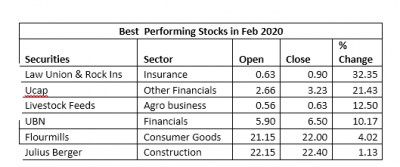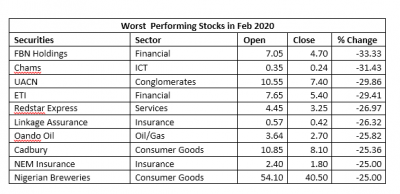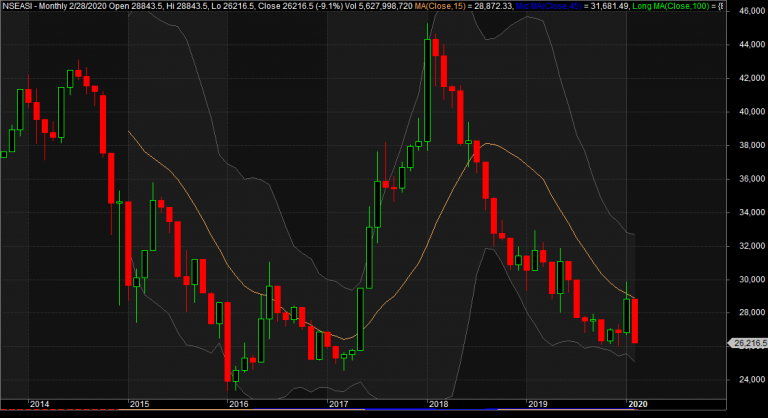February Market Roundup 2020
With just two months into trading on the Nigerian Stock Exchange for the year 2020, the downturn has, however, totally wiped outgains of the robust growth in the benchmark All-Share index on the back of negative sentiments and the persistent selloffs that beset the market in the period under review.
The downturn defied otherwise positive factors such as the prevailing low rates and declining yields in the money and fixed income markets, or the better-than-expected GDP data, which h was however blighted by the continued soaring of the Consumer Price Index or inflation rate. This has been blamed on the continued border closure, at a time the insurgency in the northwest and heightened banditry and kidnapping in the northwest continue and indeed high-level insecurity in other parts of the country, that seem to suggest the collapse of the national security infrastructure.
With all of these apparently priced into the NSE’s market fundamentals, its performance indices remained mixed, while equity prices nosedived during the period to close lower. This followed the adjustments of the Cash Reserve Requirement of banks by the Central Bank of Nigeria (CBN) in January. There were also negative reactions to the 2019 unaudited full-year results, just as the audited financials released in February, came with corporate actions, unfortunately however, the high payout from these companies, did not influence their share prices. Instead, they continued south, making it clear from the money flow index that funds had left the equity market, following CBN actions and other happenings in the domestic and global space.
The selloffs in the market and pullbacks in the price of most stocks led resulted in the share prices of some companies hitting their 52-week lows, and in the process, changing the traditional direction of the market in January. That is a month that remains unpredictable as investors are unemotional with their decisions to sell down and meet one commitment or the other such as school fees and accommodation, among others. The NSE attained a YTD return on investment of over 7.45% in January, before yielding to sell pressure that brought the market to a negative position of 2.33%.
After 20 trading sessions in a month during which the market was mostly bearish, as 16 sessions were down and just four of positive close, thereby halting the previous month’s bull run, as the NSEASI closed at 26.21646 basis points. This was made worse by Friday’s crash, driven possibly by the news of the Coronavirus has entered into the country. The Coronavirus outbreak induced selloffs in developed markets, which has extended to emerging economies impacting more stocks than people, as thousands of stocks are declining globally.
Market technicals for the period was negative as selling pressure of total transactions for the month was 100%, with volume index of 0.79 and money flow index at 38.71, to short-live the previous month’s upmarket.
Trading on the NSE occurred in 20 days during the month of February, of which the benchmark index closed red in 16 sessions and green for just four, halting the bull-run reported in January. The NSEASI closed February at 26.21646 basis points, worsened by the crash recorded on Friday, which coincided with the first trading session after the news of the first case of Coronavirus in the country, following which about 30 persons have so far been quarantined and a facility of Lafarge Africa, a major cement manufacturer shut, as part of measures to contain the virus.
During the month of February, the index touched a high of 28,843.53bps, which incidentally also was the opening figure for the period under review, representing a 9.11% decline for the month.
Similarly, market capitalisation declined by N1.2tr, after closing at N13.66tr, from N14.86tr, representing an 8.07% depreciation in value, with the difference in the index and market cap resulting from the listing of additional shares of Abbey building and AIICO Insuranceduring the month.
The dwindling fundamentals and investor confidence in the economy and market as a result of rising insecurity, inflation and lack of liquidity in the equity segment of the financial market have deflated the rally seen in January, piling selling pressure on the market. Despite the impressive dividend proposed by most companies that have published their results, which calls for new investment strategies by investors and traders determined to benefit from this trend by positioning in expectation of market recovery. A rallying and technology-driven stock market in an economy that is recovering with strong growth potentials has higher prospects of stimulating activities that support growth and development. Pullbacks here and there are part of equity investments.
The mixed economic data released so far already points to where the economy is headed, especially the latest stronger-than-expected 2019 full-year GDP of 2.27%, compared to the 1.94% reported for 2018. This is a signal that the nation’s economic recovery is on track, driven largely by improvements in Q4 2019 economic activities. We must, however, note that this latest GDP growth rate is still below that of the population at 2.7% in the period under review.
This is not forgetting the increased bank lending to the private sector, or the relatively low-interest rates in the money market which remain a boost to economic activities, coupled with the Central Bank of Nigeria’s continued intervention in the FX market which has stabilized the exchange rate of the Naira against major currencies. This is already also impacting positively on the country’s real sector.
Investdataurges the monetary and fiscal authorities not to wish away the latest comments from the Economic Advisory Council on the need for coordination between Ministries, Department, and Agencies of government. There is the urgent need for faithful implementation of the 2020budget to drive infrastructural development that will support this economic recovery, thereby ensuring that the gains of the early passage and signing into law do not amount to anything at the end.
Despite the negative sentiment before now, performance on the last trading day of February seemed to have worsened and deepened the negative outlook for the 2019 earnings reporting season, as good numbers and high dividend payout are not influencing price positively rather declining.
This last-minute meltdown dragged the NSE All-Share index’s year-to-date loss to 2.33%, just as market capitalisation growth arising from the aforesaid reason, during the same period dropped to N683.1bn, representing 7.50%.
Market breadth for the month was negative and weak as the number of decliners outpaced advancers in the ratio of 67:6 to short-live the previous month bull run and reversed the January rally induced by the high inflow of funds into the equity space in search of better returns.
The month’s biggest decliners were FBN Holdings, which was heavily impacted by the negative sentiment for banking stocks, following which it lost 33.33% of its opening price; followed byChams’ 31.43% loss; ahead of UACN’s 29.86% fall; while EcobankTransnational Incorporated followed with 29.41%; among others.

The advancers were led by Law Union & Rock Insurance, which closed 32.35% better, in what may be investors’ reaction to the acquisition of its entire share in issue by a venture capital firm (READ MORE); ahead of United Capital’s 21.43% gain; while Livestock Feeds garnered 12.50%; Union Bank of Nigeria, 10.17%; and Flourmills, 4.02%; among others.

Transaction volume in February dropped by 33.3% to 5.63bnshares, as against the 8.44bn exchanged in January.
During the month, Nigerian Breweries, Zenith Bank, Transcorp Hotel, United Capital and Africa Prudential, MTNN and UBA, released their 2019 full-year results, recommending dividend payment for shareholders’ approval.
As traders and investors position for earnings season amidst the downward movement in the market, the decision on whether to HOLD, BUY or SELL would depend on your investment objectives and whether earnings beat market expectation and shareholders are rewarded adequately in reports being expected by the market ahead of March end’s deadline.
Considering these factors, investors who understand the workings of the stock market should identify and position in good stocks among the over 110 quoted companies on the NSE with December 31, 2019, financial year-end which are due to release their audited reports on, or before March 31.
Also, since investment is against expectation and the price you are willing to pay for a stock is the value you hope to extract in the future, which is why when such expectation is not met there is a need to cut losses quickly to protect funds.
As investors, it is expected that you relate the current selling price of the stock on the floor of the exchange to its Q4 unaudited account, the previous year’s full Earnings Per Share and the last dividend paid, since the ongoing correction had made many stocks cheaper and boosted their yield. Such comparisons will help you project whether the company is likely to pay certain amount as a dividend or not, before buying into a stock. Earnings have always been a function of equity price movements, in addition to corporate actions of these companies, which are expected to attract more market players, dividend investors and possibly foreign players.
In the Nigerian stock market, the month of March is the peak period of the earnings season which suggests that traders should be in the market before now to benefit from the earnings season momentum. This has been further made easy by the recently released unaudited Q4 numbers given insight on the strength of the company’s position to guide your investment decision.
Technical View of the Market on Monthly Time Frame
The monthly chart above shows that the market has been bearish in the last 20 months as it below the 20 and 50 day moving average. The momentum behind the general market is low as reflected in low volume traded and money flow index for the period as pullbacks and correction have forced many who had taken position at the beginning of the year. We advise investors to hold and watch the corrective wave that is going on.
What to expect
•The oscillating trend of equity prices due to profit-taking and disappointment in some results. Also, the source of funds brought to the market may cause fluctuations as local and foreign institutional investors’ trade in the market. The up and down movement will continue.
•More audited and quarterly earnings would be released into the market this period. Earnings from blue-chip companies may strengthen market fundamentals if such beat expectations.
• As investors reshuffle their portfolios and go for strong and fundamentally sound stocks with high Dividend Yield and the possibility of bonus, we expect stock prices to go in the upward direction.
• A more vibrant market may be ahead, as market players position for the last month of the first quarter and taking profit, while repositioning for the second quarter. While expecting liquidity to improve.
• Managing risk and protecting capital at this point is very important, as you determine when to buy or sell by watching the stocks and the market, using technical analysis.
• Let numbers emanating from companies and dates, guide you into a profitable investment.
Also, expect volatility and repositioning to continue, while profit-taking will reduce the strength of expected payout and earnings surprises.
However, we would like to reiterate that investors should not panic but go for equities with intrinsic value, especially during this season when dividend payment is ongoing.
We advise investors to allow numbers to guide their decisions while repositioning for the year trading activities, especially now that stock prices remain volatile amidst improving company, economic and market fundamentals.
Again, the current undervalued state of the market offers investors opportunities to position for the short, medium and long-term, which is why investors should target fundamentally sound, and dividend-paying stocks for possible capital appreciation in the New Year.
This was noted in the 10 golden stocks and trading ideas for 2020, as discussed extensively during the Investdata 2020 Traders & Investors Summit held in Lagos.
Also, traders and investors need to change their strategies, because of the NSE’s pricing methodology, the CBN directives and their impact on the economy in the nearest future.
Meanwhile, the Investdata team welcomes you to a bullish 2020. The home study packs of our Invest 2020 Opportunities and Trade Ideas Summit, containing the 10 Golden Stocks for 2020 are available. To obtain your pack send ‘Yes’ or ‘Stock’ to 08028164085, 08032055467, 08111811223 now.
Ambrose Omordion
CRO | Investdata Consulting Ltd
info@investdataonline.com
info@investdata.com.ng
ambrose.o@investdataonline.com
ambroseconsultants@yahoo.com
Tel: 08028164085, 0803205546








